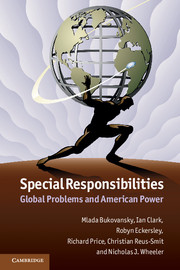Preface
Published online by Cambridge University Press: 05 June 2012
Summary
Preface
Some members of this team of authors have occasionally collaborated together over the years and decades. Collectively, we all came together for the first time in 2004, as part of a larger group working on a project on ‘Resolving International Crises of Legitimacy’, funded by the British Academy. That project was born of our shared interest in issues of international legitimacy, and how this interacted with ‘power’ in world politics. The specific legacy of that undertaking was a special issue of the journal International Politics, 44 (2/3) 2007. The broader legacy was the immense intellectual stimulus of working together as a group, and when the opportunity arose to resume this collaboration, it was immediately seized. This opportunity was created in 2007 by a funding award from the UK Economic and Social Research Council (ESRC) that included a collaborative dimension, and we all gratefully acknowledge this generous support. Given that throughout we have been variously based in Australia, Canada, Italy, the UK and the US, the award enabled periodic workshops that brought us together, and without which this book would not have been possible.
The award covered a generic project on the social bases of American power. In part, this represented a carry-over from the previous study: if an institution were to suffer a ‘crisis’ of legitimacy, how might this be resolved? What role should the United States specifically play in bringing about this resolution? These questions appeared to become even more pertinent with the election of the Barack Obama administration. Our initial intention was to approach this under the rubric of ‘hegemony’, as this was already the principal element of the cognate research being undertaken by Ian Clark as part of his individual role in the overall ESRC project. However, in the course of our meetings, it gradually became clear that what was routinely expected of hegemons was that they would bear special responsibilities for contributing to the solution of global problems. Slowly, the main focus on hegemony diminished and was replaced by that on special responsibilities. We wanted to emphasise that our theory of special responsibilities was one specific way of elaborating our general approach to the social constitution of power. This also justified the focus on the US as it offered a useful framework for disaggregating US power in particular.
- Type
- Chapter
- Information
- Special ResponsibilitiesGlobal Problems and American Power, pp. vii - ixPublisher: Cambridge University PressPrint publication year: 2012



